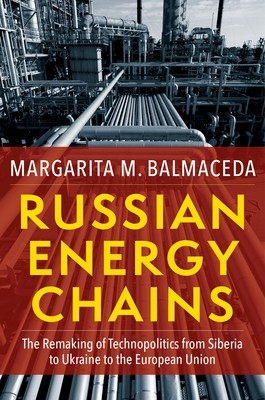
- We will send in 10–14 business days.
- Author: Margarita M Balmaceda
- Publisher: Columbia University Press
- ISBN-10: 0231197497
- ISBN-13: 9780231197496
- Format: 15.2 x 22.6 x 2.5 cm, softcover
- Language: English
- SAVE -10% with code: EXTRA
Reviews
Description
Russia's use of its vast energy resources for leverage against post-Soviet states such as Ukraine is widely recognized as a threat. Yet we cannot understand this danger without also understanding the opportunity that Russian energy represents. From corruption-related profits to transportation-fee income to subsidized prices, many within these states have benefited by participating in Russian energy exports. To understand Russian energy power in the region, it is necessary to look at the entire value chain--including production, processing, transportation, and marketing--and at the full spectrum of domestic and external actors involved, from Gazprom to regional oligarchs to European Union regulators.
This book follows Russia's three largest fossil-fuel exports--natural gas, oil, and coal--from production in Siberia through transportation via Ukraine to final use in Germany in order to understand the tension between energy as threat and as opportunity. Margarita M. Balmaceda reveals how this dynamic has been a key driver of political development in post-Soviet states in the period between independence in 1991 and Russia's annexation of Crimea in 2014. She analyzes how the physical characteristics of different types of energy, by shaping how they can be transported, distributed, and even stolen, affect how each is used--not only technically but also politically. Both a geopolitical travelogue of the journey of three fossil fuels across continents and an incisive analysis of technology's role in fossil-fuel politics and economics, this book offers new ways of thinking about energy in Eurasia and beyond.EXTRA 10 % discount with code: EXTRA
The promotion ends in 15d.00:37:09
The discount code is valid when purchasing from 10 €. Discounts do not stack.
- Author: Margarita M Balmaceda
- Publisher: Columbia University Press
- ISBN-10: 0231197497
- ISBN-13: 9780231197496
- Format: 15.2 x 22.6 x 2.5 cm, softcover
- Language: English English
Russia's use of its vast energy resources for leverage against post-Soviet states such as Ukraine is widely recognized as a threat. Yet we cannot understand this danger without also understanding the opportunity that Russian energy represents. From corruption-related profits to transportation-fee income to subsidized prices, many within these states have benefited by participating in Russian energy exports. To understand Russian energy power in the region, it is necessary to look at the entire value chain--including production, processing, transportation, and marketing--and at the full spectrum of domestic and external actors involved, from Gazprom to regional oligarchs to European Union regulators.
This book follows Russia's three largest fossil-fuel exports--natural gas, oil, and coal--from production in Siberia through transportation via Ukraine to final use in Germany in order to understand the tension between energy as threat and as opportunity. Margarita M. Balmaceda reveals how this dynamic has been a key driver of political development in post-Soviet states in the period between independence in 1991 and Russia's annexation of Crimea in 2014. She analyzes how the physical characteristics of different types of energy, by shaping how they can be transported, distributed, and even stolen, affect how each is used--not only technically but also politically. Both a geopolitical travelogue of the journey of three fossil fuels across continents and an incisive analysis of technology's role in fossil-fuel politics and economics, this book offers new ways of thinking about energy in Eurasia and beyond.

Reviews